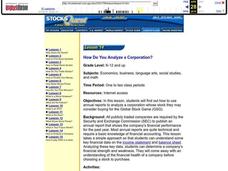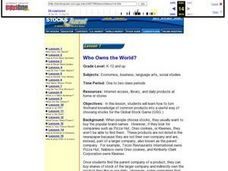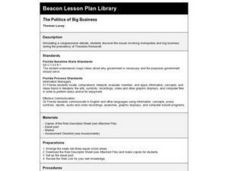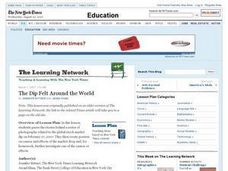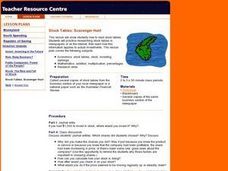Curated OER
Lesson 6 How Does News Influence Stock Prices?
Students see that economic news and business events can change the price of a stock. They see that the unexpected events that benefit or harm the company, in turn, moves the company's stock price up or down.
K12 Reader
The Great Depression
Try out this reading passage when teaching your class about the 1920s and 1930s. After reading the text, which provides an overview of some major events in these years, learners respond to five related questions.
Curated OER
Lesson 10 What is an Initial Public Offering (IPO)?
Students understand the difference between primary and secondary stock markets. Through the activities in this lesson, students predict the next best time to invest in IPOs for the Global Stock Game.
Curated OER
From the Store to the Shopper
Students explore the marketing process that companies use, including their advertising campaigns. As a class, they discuss how supermarkets develop new brands, determine how to package their goods, price them, and select the products....
Curated OER
In Your Own Backyard
Learners identify entrepreneurial opportunities that exist in their own community. From this information they determine possible market niches and identify potential businesses that could be started to meet the demands of these niches...
Curated OER
The Ice Cream Shop
Second graders read books about ice cream and plan an ice cream sundae party for the class. They research ingredients and determine how much the party cost each student. They hold a mock opening for an ice cream store and have their party.
Curated OER
Downloading Music
Students study the effect that downloading has had on the music industry. As a class, students discuss what they know and do not know about the laws of music downloading. Small groups create a marketing plan to help reduce the amount...
Curated OER
Buy Low, Sell High
Students investigate the stock market and investing in corporate stocks by creating an investment portfolio. They develop database worksheets that track their stock's performance over a specified period of time. Students use their...
Curated OER
Making Money
Students form a company to see it they can create a product that can sell and make a profit for the company. Working in small groups, they create a business plan and gather the resources to make their product. Students market and sell...
Curated OER
Advertising Through the Decades
Twelfth graders compare and contrast advertising styles and motives from 1920 to present. Using internet research and print advertisements students make comparisons and inferences about the function of marketing. At the culmination of...
Curated OER
Stock Research
For this economics worksheet, students conduct their own research in order to respond to the 12 short answer questions pertaining to the stock market.
Curated OER
Lesson 2 How Do You Find Stock Symbols?
Students practice finding stock symbols by company, industry, and country. Stock symbols are necessary to find company information such as stock charts, news, and financial data on the Internet.
Curated OER
How Do You Analyze a Corporation?
Students find out how to use annual reports to analyze a corporation whose stock they may buy for the Global Stock Game. They read the investor information section, which provides detailed information about the company's products and...
Curated OER
Who Owns the World?
Students discover how to turn firsthand knowledge of common products into a useful way of choosing stocks for the Global Stock Game. Once students find the parent company of a product, they can buy shares of stock of the larger company
Curated OER
Lesson 1 Who Owns the World?
Students experience how to turn firsthand knowledge of common products into a useful way of choosing stocks for the Global Stock Game. They engage in a simulation of buying stocks.
Curated OER
The Politics of Big Business
Middle schoolers role-play the responsibilities of the House of Representatives as they consider how to solve the problem of undue influence by big business monopolies. They evaluate their proposed solutions and write an essay with their...
Curated OER
The Market Power Game
Students play a game to evaluate the power of competition in the four types of market structures. They describe characteristics and give examples of pure competition, monopolistic competition, oligopoly, and monopoly.
Curated OER
The Dip Felt Around the World
Young scholars share their opinions about a story about a sudden decline in China's stock markets. After reading an article, they identify the global impact of China's falling stock markets. They create a cause and effect map about the...
Curated OER
Dot-Gone
Young scholars read "Failed Web Sites Live On, Gone but Not Forgotten." students examine why some Internet businesses have failed and develop business models for successful new Internet companies.
Curated OER
Over-the-Counter Culture
Learners explore the changing consumer habits of Americans of various socioeconomic classes. They examine the exact costs of products, services and interest rates mentioned in the article and reflect on their own spending habits and...
Curated OER
Selling Fuel Oil at a Loss
Learners are asked to advise a fuel oil dealer on a possible investment. They must use two different rates to set up an equation and solve to determine how much oil he should sell now to break even after selling the remainder the next...
Curated OER
Who Is My Competitor?
Students brainstorm businesses in their community and which businesses compete for the same business. They view the Yellow Pages as a resource to identify business who compete against one another and offer similar products. They...
Curated OER
Stock Tables: Scavenger Hunt
Students investigate how to read stock tables and research stock tables in newspapers or on the Internet. They discuss how they would invest $1000 in stock, examine how to keep track of their shares online, and complete a worksheet in...
Curated OER
What is Your Future Worth?
Students use the "StocksQuest Calculator" to calculate the future value of an investment. They compare and contrast investing in the S&P 500 to CDs, T-bonds or bank accounts.














